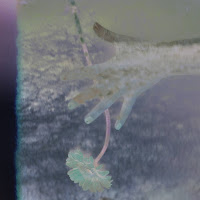As an artist, musician and performer, Katie Gerardine O'Neill is perhaps best known for being a member of Dublin-based trio Alien She, whose mix of high-intensity pop, punk and indie - with an experimental bent - saw the band make a name for themselves on the Irish underground music scene. In her new solo album Into the Beyond - the follow-up to 2021's Message Green - O'Neill delves further into the experimental possibilities of music, embracing everything from field recordings to unusual samples, and featuring a free association of strings, percussions and synthesisers, all to produce songs which she styles as "ambient noise art."
The album opens with muscular, energetic strings on "10 Voices". Like most of the songs on this album, "10 Voices" feels free-wheeling, guided less by motifs, riffs or melodies and more by O'Neill's introspective musical journey. However, amidst the chaos of this song - and of scattering synth beats and tape-recorded animal sounds - the strings tie everything together, leading it from chaos to an absorbing ambience over six minutes. On the second track, "Talk", O'Neill changes things, introducing echoey vocals similar to fellow string-and-voice-and-synth experimenter Arthur Russell. The music here is still ambient; it's elevator muzak - if the elevator in question was taking you down to a level where your most unhinged dreams could be accessed.
As becomes evident when "Talk" ends and "Matrimony" begins, O'Neill's album constantly shifts with each song - in terms of genre, style, instrumentation, ambition, and theme. For example, on the third track, Gilbert O'Sullivan's quaint 1971 song 'Matrimony' is spliced with punishing reverb and distortions, morphing it into a terrifying version of itself. This is one of five songs on the album under two minutes long and gives very little for the listener to grab hold of. Similar to the glowing synths of "Time Warp", it's beautiful and exciting - but it feels like it's over before it starts.
By the halfway point of the album, on "Animal", O'Neill warms more explicitly to one of her abiding musical themes: existentialism. With her voice coming through more clearly now (the echoes are gone), she croons: "We just keep going round and round/trying to find the next hustle," before asking, "What happened to being an animal?" For an album of intense experimentation, the lyrics are perhaps the least experimental part of what O'Neill does, with the artist sometimes - as indicated here - falling into derivative clichés. But that's OK, though, because this is a record where words are more of a tool to let the artist's voice come through.
Yet, even as I write that, it's far from always being the case. For example, on "Dream", the standout song from the album, O'Neill delivers a whispered spoken-word monologue which feels like a warped version of an ASMR soliloquy, complete with some beautiful imagist verse.
In her description of the album, O'Neill claimed that she wanted to dive into the "sublime mysteries of the universe". On an album which is by turns sublime and mysterious - she's achieved her aim.
★★★½

